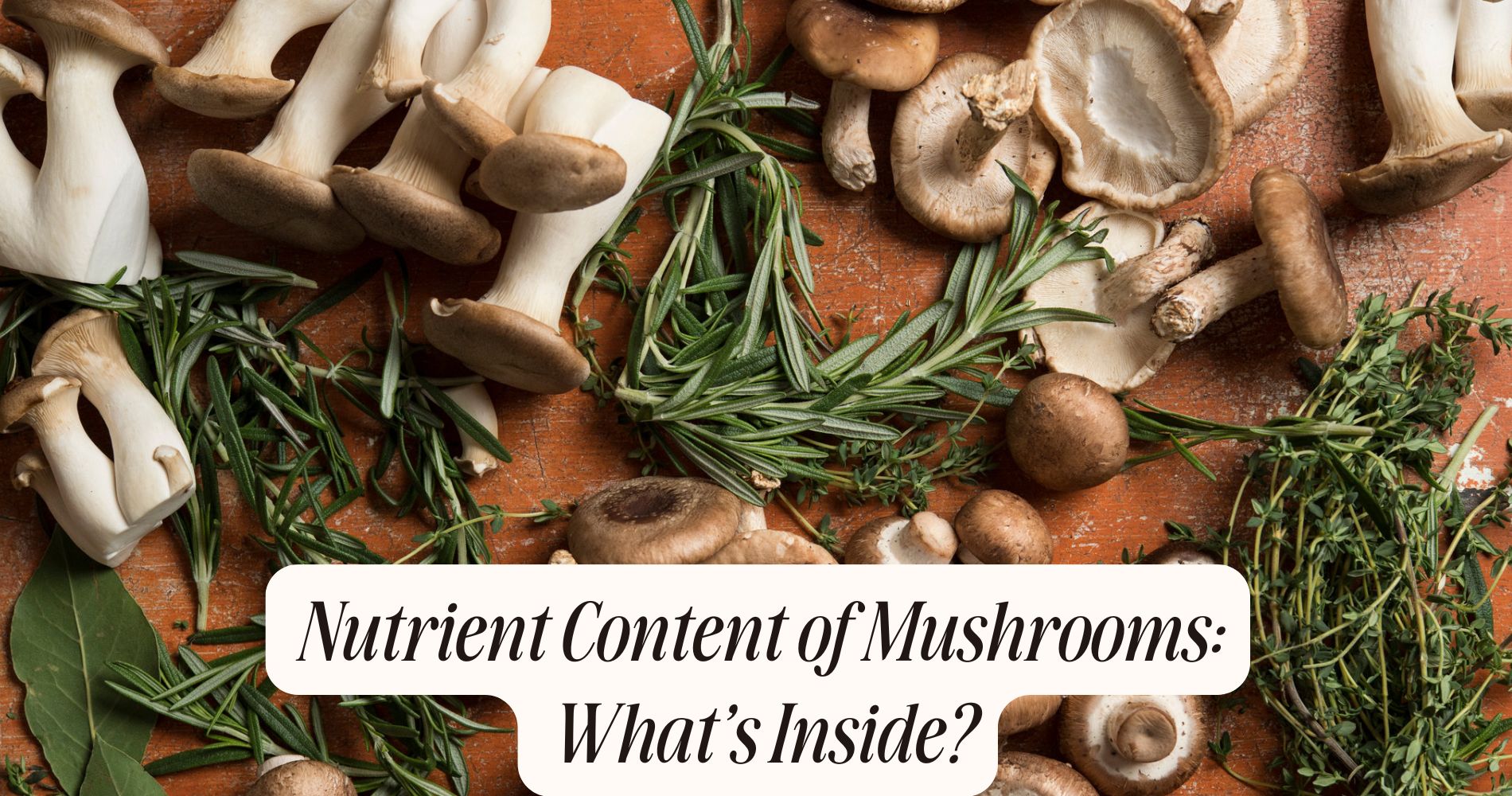
Nutrient Content of Mushrooms: What’s Inside?
Mushrooms are packed with essential nutrients that make them a valuable addition to any diet. The nutrient content of mushrooms includes vitamin D, which supports bone health, and B vitamins that fuel energy and boost metabolism. They are also rich in minerals like selenium and potassium, promoting immune function and nerve health. With powerful antioxidants and fiber, mushrooms aid digestion and help protect against chronic diseases. Plus, with 2-4 grams of protein per 100 grams, they contribute to your daily amino acid intake. Keep reading to explore how mushrooms can elevate your nutrition!
Essential Vitamins Found in Mushrooms
Mushrooms, a diverse group of fungi, are a rich source of essential vitamins that contribute considerably to a balanced diet.
Significantly, they provide vitamin D, which is vital for calcium absorption and bone health. Unlike most plants, mushrooms can synthesize vitamin D when exposed to sunlight, making them an excellent dietary source, especially in non-sunny climates.

Additionally, mushrooms are abundant in various B vitamins, including riboflavin, niacin, and pantothenic acid. These B vitamins play key roles in energy production and red blood cell formation.
Consuming mushrooms can help you meet your daily vitamin requirements, supporting metabolism and overall health. Integrate them into your meals to harness their full nutritional potential and support your body's physiological functions efficiently.
Mineral Richness of Mushrooms
While often overlooked, the mineral content of mushrooms is impressive and beneficial for maintaining ideal health.
Mushrooms are a rich source of essential minerals like selenium, potassium, and copper. These trace elements play significant roles in various metabolic processes.
Selenium, for instance, boosts your immune system and protects cells from damage. Potassium aids in maintaining fluid balance and supports nerve function. Copper contributes to red blood cell formation and nerve health.
Importantly, mushrooms enhance mineral absorption due to their unique bioactive compounds. Studies show that these compounds facilitate the uptake of minerals in your gut, maximizing their health benefits.
Antioxidant Properties in Fungi
Renowned for their diverse health benefits, fungi, including mushrooms, possess remarkable antioxidant properties that play an essential role in combating oxidative stress.
You'll find that these antioxidant compounds, such as ergothioneine and glutathione, are abundant in various mushroom species. These compounds work tirelessly to neutralize free radicals, which are harmful molecules that can damage cellular structures and contribute to aging and disease.

Evidence suggests that regular mushroom consumption can boost your body's defense mechanisms, enhancing your overall health. Studies have shown that dietary intake of these antioxidants may reduce the risk of chronic conditions like cancer and cardiovascular diseases.
Fiber Content and Digestive Health
Although often overlooked, the fiber content in mushrooms greatly contributes to digestive health.
Mushrooms contain both soluble and insoluble fiber, which play distinct roles in your digestive system. Soluble fiber is known to support a healthy gut microbiome by serving as a prebiotic. It fuels beneficial bacteria, enhancing their ability to thrive and maintain balance in your gut.
Insoluble fiber, on the other hand, aids in regular bowel movements by adding bulk to stool and facilitating its passage.
Moreover, dietary fiber impacts the activity of digestive enzymes. By slowing digestion, it allows enzymes more time to break down nutrients efficiently. This extensive support guarantees ideal nutrient absorption, promoting overall digestive well-being.
Including mushrooms in your diet is a practical step toward better digestive health.
Protein and Amino Acids in Mushrooms
Mushrooms offer more than just fiber benefits; they're also a valuable source of protein and amino acids, which are fundamental for numerous bodily functions.
Different mushroom varieties, such as shiitake, oyster, and button mushrooms, provide diverse amino acid profiles. These profiles include essential amino acids like lysine and leucine, vital for tissue repair and muscle growth.

On average, mushrooms contain about 2-4 grams of protein per 100 grams, making them a moderate protein source. Despite their low protein content compared to animal products, mushrooms complement other plant-based foods to create a complete protein intake.
Including various mushroom varieties in your diet can help meet amino acid needs, contributing to overall nutritional balance and supporting metabolic processes.
Elevate Your Wellness with SUPER MUSHROOM GUMMIES
Looking to harness the powerful nutrient content of mushrooms in an easy, delicious way? Well Gummies' SUPER MUSHROOM GUMMIES pack the benefits of 10 functional mushrooms into a convenient, chewable form. Designed to fuel your brain and energize your body naturally, these vegan-friendly gummies deliver calmer energy, sharper focus, and immune support—all without the jitters or crash. Plus, with a fresh wild berry flavor, they taste just as good as your favorite candy. Experience the power of mushrooms in every bite!
Frequently Asked Questions
Can Mushrooms Help With Weight Loss?
You're considering weight loss, and mushrooms might help. Different mushroom varieties offer weight loss benefits due to their low-calorie content and high fiber. They can improve satiety and metabolism, supporting your weight loss journey when combined with a balanced diet.
Are All Mushrooms Safe to Eat?
You shouldn't assume all mushrooms are safe to eat. While there are many edible varieties, some toxic species exist. Consuming these can cause serious health issues. Always guarantee proper identification or consult an expert before consumption.
How Do Mushrooms Support Immune Health?
You're probably curious about how mushrooms support immune health. Various mushroom varieties contain immune boosting properties like beta-glucans and antioxidants, which enhance your body's defense mechanisms. Studies show these compounds can stimulate immune cells and improve overall immunity.
What Is the Calorie Content of Mushrooms?
You're curious about the calorie content of mushrooms. They've got low caloric density, with just 15 calories per 100-gram serving size. This makes them an excellent choice if you're watching your caloric intake while seeking nutrient-rich foods.
Do Mushrooms Contain Any Unique Compounds Beneficial for Health?
You'll find mushrooms contain unique compounds like ergothioneine and selenium, which offer anti-inflammatory properties and antioxidant benefits. These compounds help reduce oxidative stress and inflammation, enhancing overall health. Research supports their potential in preventing chronic diseases.
Conclusion
In exploring mushrooms' nutrient content, you'll find they offer a wealth of benefits. Packed with essential vitamins like B-complex and D, they're vital for your metabolic health. Their mineral richness, including selenium and potassium, supports various bodily functions. Mushrooms' antioxidant properties help protect your cells from damage. With their fiber content, they aid in digestion and promote gut health. Furthermore, the protein and amino acids they contain contribute to muscle repair and overall body maintenance.




